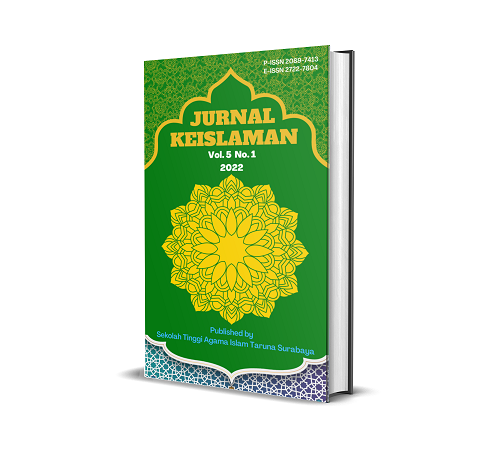PEMBAHARUAN KONSEP KAFA’AH DALAM PERKAWINAN
Abstract
The purpose of this study is to reformulate efforts to renew the concept of kafa'ah in marriage which often occurs in differences among scholars. While library research is the type in this research that is studied qualitatively by compiling data systematically and is carried out through descriptive-analytic nature with a framework of thinking using deductive methods. Furthermore, this study states that the scholars have different opinions regarding the division of qualification criteria for kafa'ah in choosing a partner, but the majority of scholars argue that there is only one important and non-negotiable factor in the application of the concept of kafa'ah, namely the religious factor. Then, the renewal of the kafa'ah concept can be simplified in the division of kafa'ah qualifications into only two qualifications, namely; First, the religious factor as an important and core factor in determining the selection of a prospective partner and second, determining qualifications is returned to the two prospective brides who want to get married. This simplification aims to increase the progressiveness between the two prospective married couples and also to foster a sense of responsibility for what has been chosen in determining their partner, so that it is hoped that the desired goal of marriage will be realized, namely building a sakinah (peaceful), mawaddah (full love), wa rahmah (love).References
Abd. Al-Wahhab Khallaf. 1978. Ilmu Usul Fiqh. Kuwait: Dar al-Qalam.
Abdullah, Boedi, and Beni Ahmad Saebani. 2013. Perkawinan Perceraian Keluarga Muslim. Bandung: Pustaka Setia.
Ahmad Saebani, Beni. 3010. Fiqh Munakahat 2. Bandung: Pustaka Setia.
Ala ad-Din as-Samarqandi. 1993. Tuhfat Al-FuqahÄ. 2nd ed. Beirut: Dar al-Kutub al-Ilmiyah.
Alhamdani, H.S.A. 1989. Risalah Nikah Hukum Perkawinan Islam. Jakarta: Pustaka Amani.
Amir Syarifuddin. 2006. Hukum Perkawinan Islam Di Indonesia. Jakarta: Kencana.
Az-Zuhaili, Wahbah. 2011. Fiqih Islam Wa Adillatuhu, Terj. Abdul Hayyie Al-Kattani, Dkk. Jakarta: Gema Insani Press.
Dachlan, Aisjah. 1969. Membina Rumah Tangga Bahagia Dan Peranan Agama Dalam Rumah Tangga. Jakarta: Jamunu.
Dewi Sundari. 2017. “Memahami Makna Bobot, Bibit, Bebet.†Kompasiana.Com. Accessed January 31, 2022. https://www.kompasiana.com/dewisundari/591badbd317a61a21829b2b8/memahami-makna-bobot-bibit-bebet.
Djamaan Nur. 1993. Fikih Munakahat. Semarang: Dina Utama.
Ghazaly, Abdul Rahman. 2006. Fiqih Munakahat, Cet. Ke-2. Jakarta: Kencana.
Idhamy, Dahlan. 1984. Azas-Azas Fiqh Munakahat Hukum Keluarga Islam. Surabaya: Al-Ikhlas.
Iffatin, Nur. 2012. “Pembaharuan Konsep Kesepadanan Kualitas (Kafaa’ah) Dalam Al-Qur’an Dan Hadist.†Jurnal Studi Agama dan Pemikiran Islam.
Jahroh, Siti. 2016. “Reinterpretasi Prinsip KafÄ’ah Sebagai Nilai Dasar Dalam Pola Relasi Suami Istri.†Al-Ahwal: Jurnal Hukum Keluarga Islam 5, no. 2, 57–92.
Karimullah, Suud Sarim. 2021. “Konsep Keluarga Smart (Bahagia) Perspektif Khoiruddin Nasution.†Tafhim Al-’Ilmi 13, no. 1, 75–88.
———. 2021. “Urgensi Pendidikan Pra Nikah Dalam Membangun Keluarga Sejahtera Perspektif Khoiruddin Nasution.†Jurnal Kariman 9, no. 2, 229–246.
Nasution, Khoiruddin. 2013. Hukum Perkawinan 1 Dilengkapi Perbandingan UU Muslim Kontemporer (Edisi Revisi). Yogyakarta: Academia dan Tazzafa.
Roby, Aba Fahmi. 2020. “Konsep Kafa’ah: Studi Pandangan Habaib Di Kabupaten Jember.†rechtenstudent 1, no. 3, 293–301.
Sabiq, Sayyid. 2017. Fiqih Sunnah 2. Jakarta: Republika Penerbit.
Shalih bin Fauzan bin Abdullah al-Fauzan. 2013. Mulakhkhas Fiqhi. Jakarta: Pustaka Ibnu Katsir.
Tihami, and Sohari Sahrani. 2013. Fikih Munakahat. 3rd ed. Jakarta: Raja Grafindo.
Copyright (c) 2022 Suud Sarim Karimullah, Arif Sugitanata

This work is licensed under a Creative Commons Attribution-ShareAlike 4.0 International License.
Authors who publish with this journal agree to the following terms:
- Authors retain copyright and grant the journal right of first publication with the work simultaneously licensed under a Creative Commons Attribution-ShareAlike that allows others to share the work with an acknowledgement of the work's authorship and initial publication in this journal.
- Authors are able to enter into separate, additional contractual arrangements for the non-exclusive distribution of the journal's published version of the work (e.g., post it to an institutional repository or publish it in a book), with an acknowledgement of its initial publication in this journal.
- Authors are permitted and encouraged to post their work online (e.g., in institutional repositories or on their website) prior to and during the submission process, as it can lead to productive exchanges, as well as earlier and greater citation of published work (See The Effect of Open Access).






















